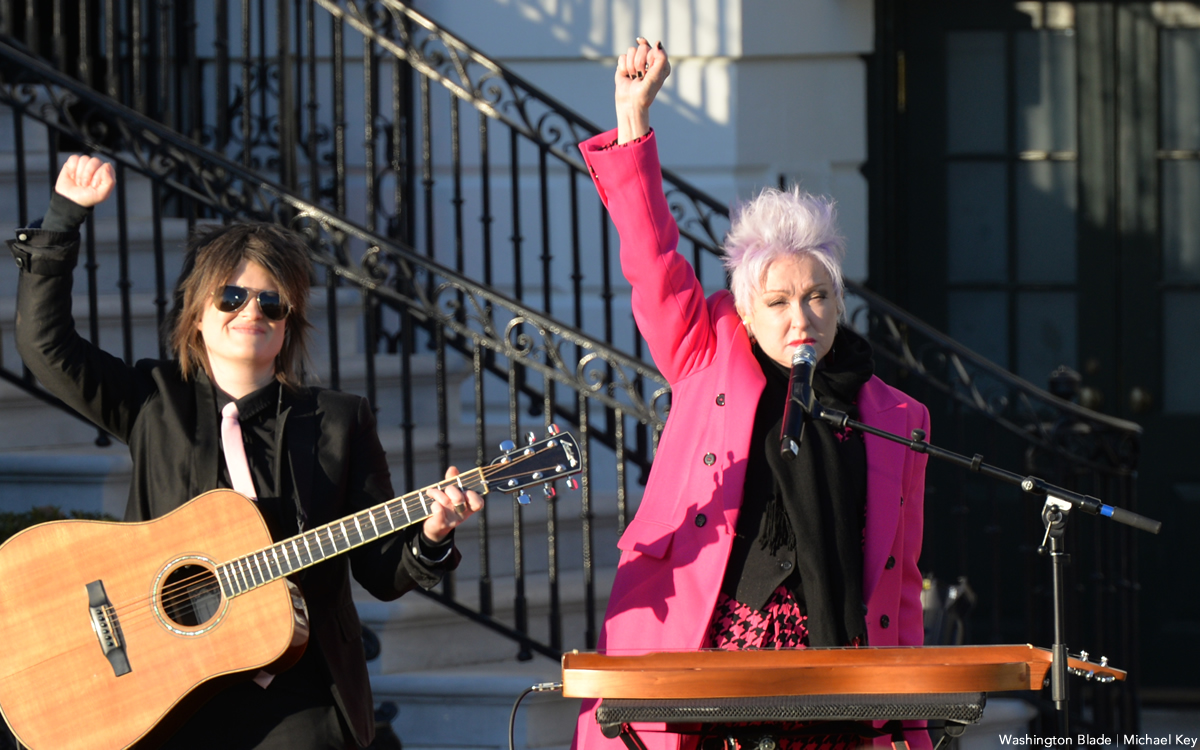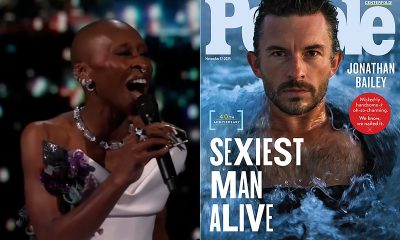Music & Concerts
Troye Sivan’s new album ‘Bloom’ buzzes with sexual yearning
Ariana Grande duet ‘Dance to This’ among record’s standout cuts


Troye Sivan previewed material from his new album ‘Bloom’ this summer at Capital Pride where he headlined. (Washington Blade file photo by Michael Key)
Things continue to look good for queer wunderkind Troye Sivan. The 23-year-old pop star is out with his second full-length album, “Bloom,” the follow-up to his successful first album,“Blue Neighbourhood,” which debuted at no. 7 in 2015.
The new record traces much the same lines as the previous. His characteristic chill dance pop returns in full vigor — or rather, mellowness — on “Bloom,” but this time in bleach blond. It’s a good sound and look for the perennially boyish Australian.
Sivan first came to notoriety as a YouTuber, where he collaborated regularly with Tyler Oakley. His coming-out video, posted five years ago, has been viewed more than eight million times. Sivan makes no bones about his queerness, evidenced no less by the title of the new album. As was much commented on in the mainstream press, the song “Bloom” is a not-so-subtle reference to bottoming. It’s a bold choice of title for an album that is musically less so. Nonetheless, Sivan once again works his dream pop magic, playing it safe without becoming redundant.
Much like the previous album, “Bloom” is a mesh of loverboy lyrics and warm, ethereal synth sounds — it’s less a break from “Blue Neighbourhood” than a companion album, a slightly more energetic side B. This is not a criticism; in fact his sound is somewhat unique among his pop music contemporaries. Drawing attention to the deeply similar character of the album might say more about our expectation that artists continually do something new and unexpected than it does about Sivan’s music.
The album opens with “Seventeen,” a song chronicling Sivan’s early sexual encounters with older men. (For the record, the age of consent in Australia is 16.) The lyrics, like those of many of his songs, have a spoken quality, giving them a relatively natural flow: “And he said age is just a number, just like any other.” Or, to take an example from the song “Postcard,” one of the most subdued and compelling tracks on the album: “I sent you a postcard from Tokyo baby/You never picked it up/I even wrote it in Japanese, baby/You didn’t give a fuck.”
The lyrics have the weight of regular speech but without sacrificing musicality. Nor are they short on wit. This is one of the more remarkable things about Sivan’s music, and it gives the impression that Sivan is telling a single, continuous story over the course of an album. But songs also buzz with sexual yearning. “Lucky Strike,” an almost enchantingly catchy tune, is a good example. With the bass thumping, he sings in his whispery tenor: “‘Cause you taste like Lucky Strikes/You drag, I light.” Sivan is, of course, no stranger to innuendo or to lyrics about smoking.
The new album certainly hasn’t been short on singles: Five have been released to date, including lead single “My My My!,” “The Good Side,” “Bloom,” “Dance to This” (featuring Ariana Grande) and “Animal.” “My My My!” has already enjoyed a fair amount of radio play and is likely destined for a long afterlife of remixes. The same can be said, though to a lesser degree, for “Bloom” and “Dance to This.” The song “The Good Side” is largely acoustic break-up song and a refreshing break from synth-heavy sounds.
The music video for “Bloom,” however, is a point of interest on its own. In bright red lipstick, Sivan wears a variety of androgynous flower-inspired gowns that look like they were taken from a J.W. Anderson runway show. It’s a fun, provocative celebration of queer identity.
The Frank Ocean-inspired “Animal”strays the farthest from the herd. If anything, it indicates a drive toward more effect-heavy, quasi-psychedelic sounds. It’s by far the most adventurous track. But the joy of this album is not in shuffling through the singles — it’s in listening start to finish. With good albums, the whole is always greater than the sum of its parts. This one is no different.
Music & Concerts
Washington chorale kicks off Christmas with vibrant program
‘Thine Own Sweet Light’ concerts planned

The full Washington Master Chorale will return for its annual holiday concert tradition with “Thine Own Sweet Light” on Friday, Dec. 19 and Sunday, Dec. 21 at St. Ann’s Catholic Church (D.C.) and Church of the Epiphany (D.C.).
The concert will feature the rich sounds of the 50-voice, a cappella chorus performing lush, seasonal choral music inspired by the theme of light. Highlights include Edvard Grieg’s “Ave Maris Stella,” Eric Whitacre’s “Lux Aurumque,” and Christopher Hoh’s “Holy, Holy, Holy is the Lord God of Hosts.” The program will also present a new work by Barcelona composer Josep Ollé i Sabaté, along with charming holiday folk songs and seasonal favorites.
For more details, visit the Washington Master Chorale website.
Music & Concerts
Queer mega stars (and allies) ready to take D.C. stages this fall
Watch LGBTQ icons light up stages across the DMV as they sing, dance, and drag their way through spectacular shows.

One of the best ways to welcome fall is by catching LGBTQ performers (and their allies) lighting up some of the D.C. area’s biggest stages. From country and pop to drag and rock, the season is packed with shows you won’t want to miss.
Maren Morris – The country, rock, and pop diva—known for hits like “The Bones” and for standing up against Nashville’s anti-LGBTQ voices—takes the stage at Wolf Trap (1551 Trap Rd, Vienna, Va.) on Friday, Sept. 12 at 8 p.m. Tickets start at $64.
RuPaul – The mother of modern drag and host of “RuPaul’s Drag Race” will spin a DJ set at Echostage (2135 Queens Chapel Rd NE) in Northeast D.C. on Sept. 20. Before RuPaul swaps wigs for headphones, Trade and Number 9 owner Ed Bailey will warm up the decks. For tickets and details visit echostage.com.
Conan Gray – The queer pop prince, celebrated for his Gen Z anthems like “Heather” and “Maniac,” brings his Wishbone Pajama Show to EagleBank Arena in Fairfax, VA, (4500 Patriot Cir) on Sept. 20 at 8 p.m. Tickets start at $113. For more info visit shop.conangray.com/pages/tour.
All Things Go Music Festival – With a lineup that includes Noah Kahan, Lucy Dacus, Kesha, Clairo, Doechii, and more, the beloved LGBTQ-friendly festival takes over Merriweather Post Pavilion (10475 Little Patuxent Pkwy, Columbia, Md.) Sept. 26–28. For tickets and details visit allthingsgofestival.com.
BERTHA: Grateful Drag – This unique tribute brings drag artistry and the sounds of the Grateful Dead to The Atlantis (2047 9th St NW) on Sept. 27. Tickets start at $47 at theatlantis.com.
Peach PRC – Rising Australian pop star and out lesbian, whose confessional tracks like “Perfect for You” and “Forever Drunk” have made her a queer TikTok darling, performs at The Atlantis on Sept. 29 at 6:30 p.m. The show is general admission only. Additional details are on theatlantis.com.
Addison Rae – The TikTok star-turned-pop princess, who’s crossed over into music with glossy hits like “Diet Pepsi” brings her sold out show to The Anthem (901 Wharf St., S.W.) on Sept. 30. Tickets are sold out, but resale options start around $80. For more info visit theanthemdc.com.
The Rocky Horror Picture Show 50th Anniversary – Celebrate the cult classic that’s been a queer midnight-movie staple for decades, with Barry Bostwick (a.k.a. Brad Majors) at the Warner Theatre (513 13th St., N.W.) on Oct. 2 at 8 p.m. Tickets start at $41 via Ticketmaster.
Chaka Khan, Patti LaBelle, Gladys Knight & Stephanie Mills – Four legends, one stage. Between Khan’s funk, LaBelle’s soul, Knight’s R&B, and Mills’ powerhouse vocals, this concert at Capital One Arena (601 F St NW) on Oct. 3 at 8 p.m. promises pure diva magic. Tickets start at $103. For more details visit capitalonearena.com.
Lorde – Joined by The Japanese House and Chanel Beads, the Grammy-winning New Zealand singer-songwriter behind “Royals” and “Solar Power” returns to The Anthem on Oct. 4 at 7 p.m. Lorde has long been embraced by queer fans for her dreamy pop and subversive lyrics. For more info visit theanthemdc.com.
Andy Bell (of Erasure) – The British queer rock icon, best known for synth-pop classics like “A Little Respect” and “Chains of Love,” brings his Ten Crowns Tour to the Lincoln Theatre (1215 U St., N.W.) on Friday, Oct. 17 at 8 p.m. Tickets are $90.45.
Doechii – The self-described queer “Swamp Princess”—and WorldPride 2025 headliner—continues her breakout year with the Live from the Swamp Tour at The Anthem on Oct. 21 at 8 p.m. Known for blending rap, R&B, and avant-garde performance art, Doechii is one to watch. Tickets start at $153.
Neon Trees – The out-and-proud Utah rockers behind “Everybody Talks” and “Animal” perform at the Lincoln Theatre on Friday, Oct. 24 at 8 p.m. Lead singer Tyler Glenn, who came out publicly in 2014, has become a strong queer voice in alternative rock. For tickets and info visit impconcerts.com.
Sasha Colby – The “RuPaul’s Drag Race” Season 15 winner strips down on the Stripped II Tour at the Warner Theatre on Nov. 2 at 8 p.m. Tickets available now on Ticketmaster.
Lola Young – The bisexual indie-pop sensation, whose raw songwriting has earned her millions of TikTok fans and multiple chart soaring hits visits The Anthem on Nov. 9 at 8 p.m. Tickets are still available.
Opera Lafayette
Featuring Mary Elizabeth Williams as Dido
+ Elijah McCormack, Chelsea Helm
Oct. 16, 7:30 p.m.
Sixth & I
PostClassical Ensemble
The Pale Blue Do: A Musical Voyage Inspired By Nature
Featuring National Geographic’s Enric Sala, Guest Curator
Wednesday, November 19, 7:30 p.m.
Terrace Theater
Washington Concert Opera
Starring Kate Lindsey, Theo Hoffman, John Moore, and Fran Daniel Laucerica
Nov. 23, 6 p.m.
Lisner Auditorium
Washington Master Chorale
An intimate a capella concert taking place in an architectural jewel, featuring cherished choral gems from Anglican and Catholic tradition and early American hymns. The concert will also present the world premiere of Christopher Hoh’s Holy, Holy, Holy is the Lord God of Hosts, and hymn singing featuring Robert Church, organist and choirmaster at St David’s.
Oct. 18, 7:30 p.m.
October 19, 5 p.m.
St. David’s Episcopal Church
Music & Concerts
Cyndi Lauper ready to have fun in Virginia
Superstar to bring final leg of farewell tour to Jiffy Lube Live

Superstar Cyndi Lauper will bring the final leg of her farewell tour “Girls Just Wanna Have Fun” to Bristow, Va., on Thursday, July 24 at Jiffy Lube Live.
Lauper’s international Farewell Tour – her first major headlining run in a decade – kicked off in North America last October, and included her first time ever headlining (and selling out) Madison Square Garden. Lauper’s performances have earned raves from the New York Times, Rolling Stone, Billboard, and many more, and surprise guests have included Chaka Khan, Sam Smith, and Hayley Williams. The tour just visited the U.K. and Europe, and will head to Australia and Japan in April.
Tickets are available on Live Nation’s website.
-

 Iran4 days ago
Iran4 days agoGrenell: ‘Real hope’ for gay rights in Iran as result of nationwide protests
-

 Virginia4 days ago
Virginia4 days agoMark Levine loses race to succeed Adam Ebbin in ‘firehouse’ Democratic primary
-

 Congress5 days ago
Congress5 days agoVan Hollen speaks at ‘ICE Out for Good’ protest in D.C.
-

 LGBTQ Non-Profit Organizations5 days ago
LGBTQ Non-Profit Organizations5 days agoNational LGBTQ Task Force brings Creating Change conference back to D.C.




















